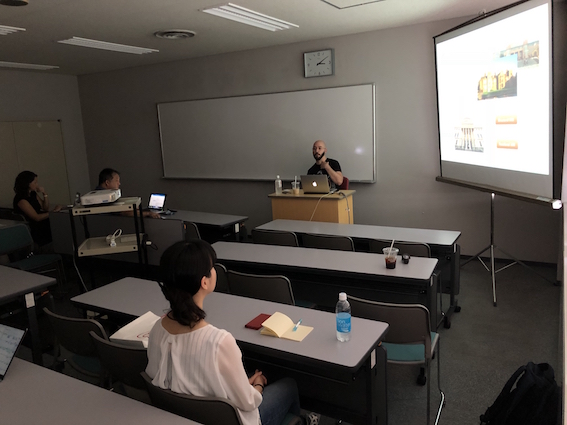2018年8月3日(金)15時00分〜18時30分 中央大学駿河台記念館410号室にて人文科学研究所研究会チーム「高次脳機能の総合的理解」主催、日本学術振興会 課題設定による先導的人文学・社会科学研究推進事業 領域開拓プログラム「脳機能亢進の神経心理学によって推進する「共生」人文社会科学の開拓」共催の公開研究会を開催しました。
講 師: Ramon Landin-Romero 氏 (The University Of Sydney 研究員)
講演タイトル:MRI biomarkers of differential diagnosis and prognosis in neuropsychiatry and neurodegeneration
要 旨:
Neurodegenerative syndromes (e.g., dementia) are characterized by the progressive loss of structure and/or function of the brain. Conversely, neuropsychiatric conditions(e.g., psychosis, depression, etc.) are not associated with gross structural changes. Instead, psychiatric syndromes are considered ‘functional’ brain disorders and associated to functional brain abnormalities. Magnetic Resonance Imaging (MRI) techniques have revolutionized the clinical neurosciences by enabling the non- invasive assess ment of brain changes in vivo. In this seminar, I will discuss the application of MRI and bioinformatics to identify sensitive and reliable neuroimaging biomarkers-objective measurements of the brain’s morphology and/or function-to inform (i) diagnosis, (ii) prognosis and (iii) prediction of disease trajectories across neuropsychiatric and neurodegenerative disorders.
講 師: Aurelie Manuel Stocker 氏 (The University Of Sydney 研究員)
講演タイトル:Non-invasive brain stimulation: a tool for the neurorehabilitation of neurological and psychiatric disorders?
要 旨:
In the last two decades, non-invasive brain stimulation (NIBS) techniques have made significant contributions to the field of neuroscience. Here I will focus on
transcranial magnetic stimulation (TMS) and transcranial direct current stimulation (tDCS) which are the two most commonly used techniques. By selectively modulating activity or cortical excitability (excitation or inhibition) and evaluating the behavioral consequences of disruption of a specific brain region, NIBS can identify causal links between the function of a brain region and its behavior. Although these techniques are still young, there is ample evidence supporting the use of NIBS techniques as a tool for enhancing cognitive functions in healthy subjects and in patients with neurological and psychiatric disorders. In this talk I will give an overview of how NIBS can be used to study the brain and how it can be applied in the neurorehabilitation of various clinical disorders.

